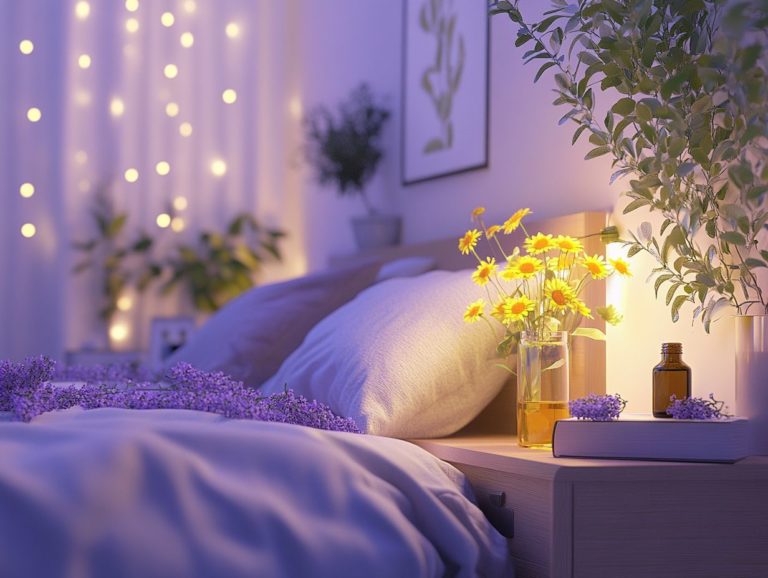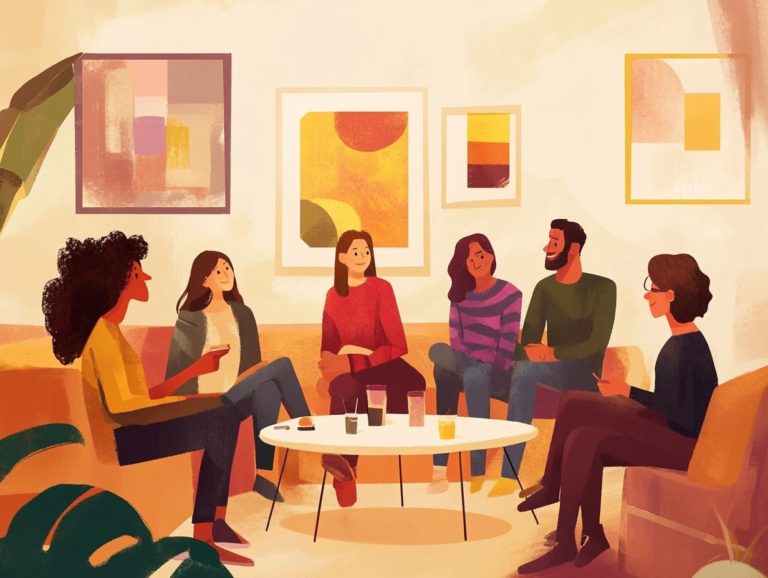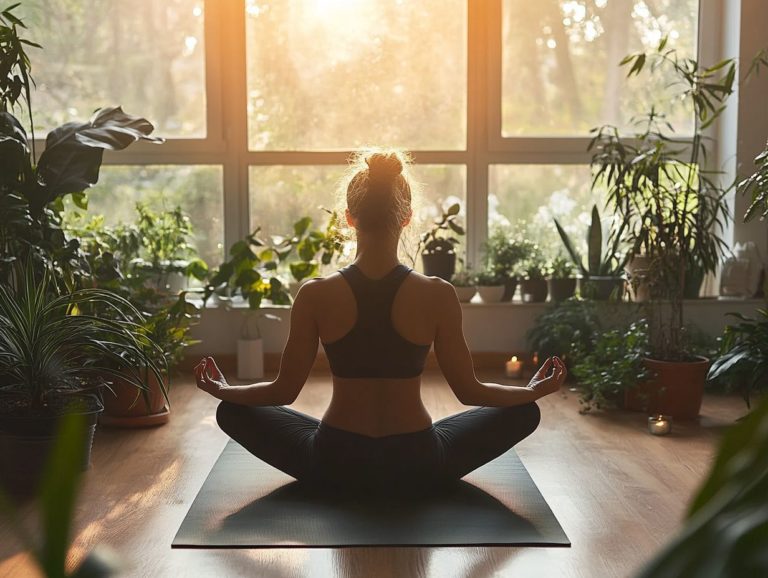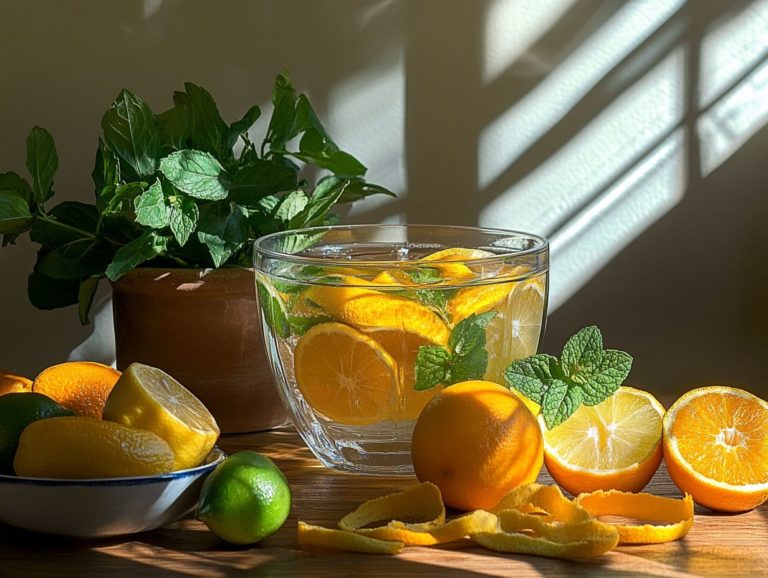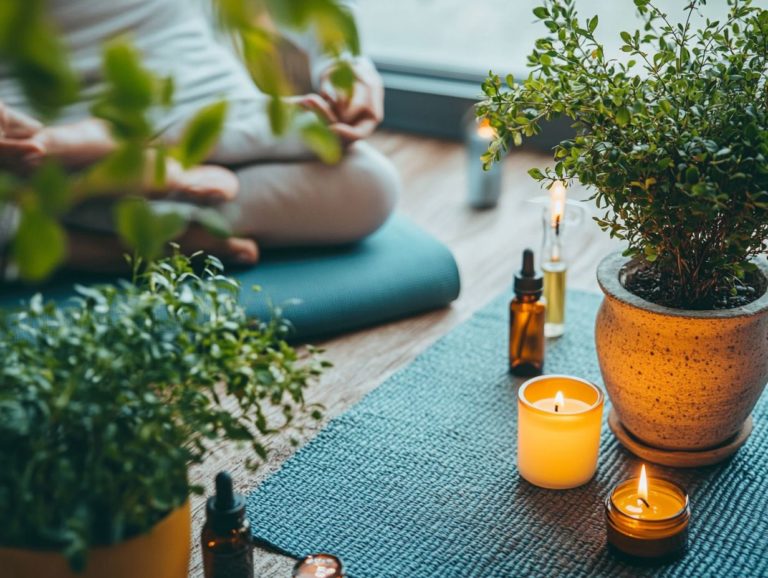Natural Remedies for General Anxiety Relief
General Anxiety Disorder (GAD) impacts millions of individuals, often presenting a daunting mix of physical and emotional symptoms that can feel all-consuming, leading to anxiety attacks for many.
Grasping the essence of anxiety and identifying its signs is essential for your well-being. The good news is that natural remedies, such as herbal supplements and aromatherapy, are available to assist you in this journey.
This article delves into an array of strategies, including cognitive behavioral therapy (which helps change negative thinking patterns), mindfulness practices, herbal supplements, and breathing exercises for relaxation. It provides you with guidance on seamlessly integrating these remedies into your daily routine, offering a holistic approach to managing anxiety effectively.
Contents
- Key Takeaways:
- Understanding General Anxiety
- Common Symptoms of General Anxiety
- Natural Remedies for General Anxiety Relief
- Herbal Supplements and Essential Oils for Anxiety
- Exercise and Physical Activity
- Incorporating Natural Remedies into Daily Life
- Creating a Holistic Approach to Anxiety Management
- Frequently Asked Questions
- What are natural remedies for general anxiety relief, including herbal remedies and aromatherapy?
- What are some common herbal remedies for general anxiety relief?
- Can exercise help with general anxiety relief?
- How can mindfulness and relaxation techniques aid in general anxiety relief?
- Are there dietary changes that can help with general anxiety relief?
- How long do natural remedies for general anxiety relief take to work?
Key Takeaways:
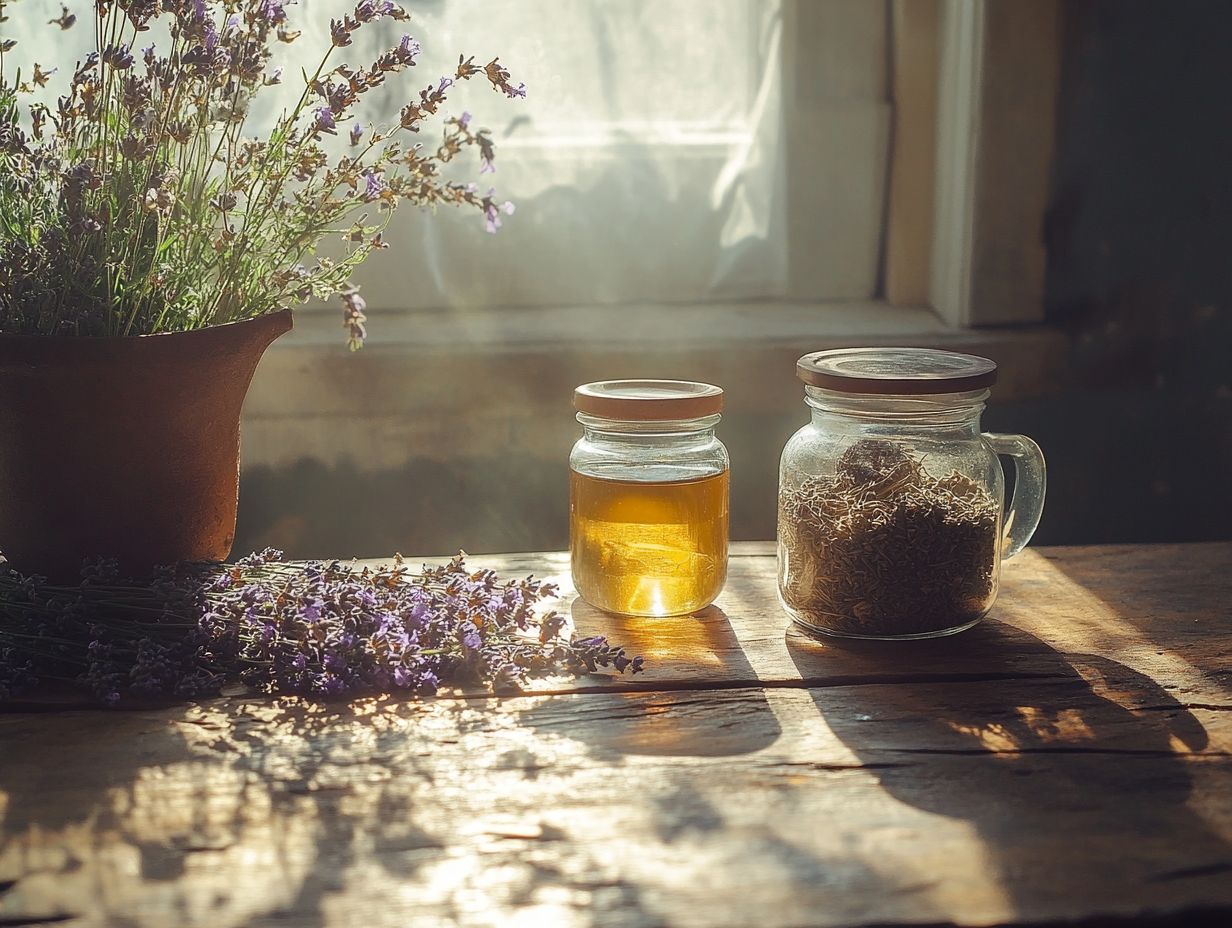
- Cognitive Behavioral Therapy can help individuals identify and change negative patterns of thinking that contribute to anxiety disorders.
- Practicing meditation and mindfulness can help reduce anxiety and increase feelings of calm and relaxation.
- Incorporating exercise and physical activity into daily life can help reduce symptoms of anxiety and improve overall well-being.
Understanding General Anxiety
Understanding General Anxiety means recognizing its various forms, especially Generalized Anxiety Disorder (GAD) and Panic Disorder, both of which affect millions. General Anxiety can manifest in different ways, impacting your daily activities and mental health.
If you have GAD, you might find yourself engulfed in excessive worry and fear, which can lead to overwhelming anxiety symptoms. On the other hand, if you’re dealing with Panic Disorder, you may experience sudden and intense panic attacks, often linked with self-harm thoughts for some individuals.
Grasping the nuances of these conditions is essential for effective anxiety management and relief. This understanding opens the door to targeted treatments and coping strategies, such as mindfulness techniques, that can significantly elevate your quality of life.
What is General Anxiety Disorder?
Generalized Anxiety Disorder (GAD) is a chronic condition characterized by excessive and uncontrollable worry about various facets of daily life. You may find yourself navigating this persistent sense of unease.
This sense of anxiety often presents through a variety of symptoms, such as restlessness, fatigue, difficulty concentrating, and irritability, all of which can significantly affect your overall mental health. The causes of GAD can be quite intricate, intertwining genetic, environmental, and psychological elements. You might recognize risk factors like a family history of anxiety disorders, stressful life events, or chronic medical conditions influencing your experience.
What sets GAD apart from other anxiety disorders is its pervasive dread that doesn t merely surface in specific situations or triggers. This broad spectrum of concern makes it essential for you to seek appropriate support and treatment tailored to address your unique challenges.
Common Symptoms of General Anxiety
Common symptoms of General Anxiety present both physical and emotional signs that can profoundly disrupt your daily life and functioning. You might experience persistent worry, muscle tension, fatigue, irritability, and difficulty concentrating each a hallmark of anxiety disorders.
Physical symptoms can include increased heart rate, sweating, and gastrointestinal issues, adding to the overall distress you face. Spotting these symptoms quickly can change your life! Recognizing them is crucial for timely intervention and effective anxiety management, which can significantly enhance your quality of life.
If you recognize these signs in yourself, don’t hesitate to reach out for support.
Physical and Emotional Signs
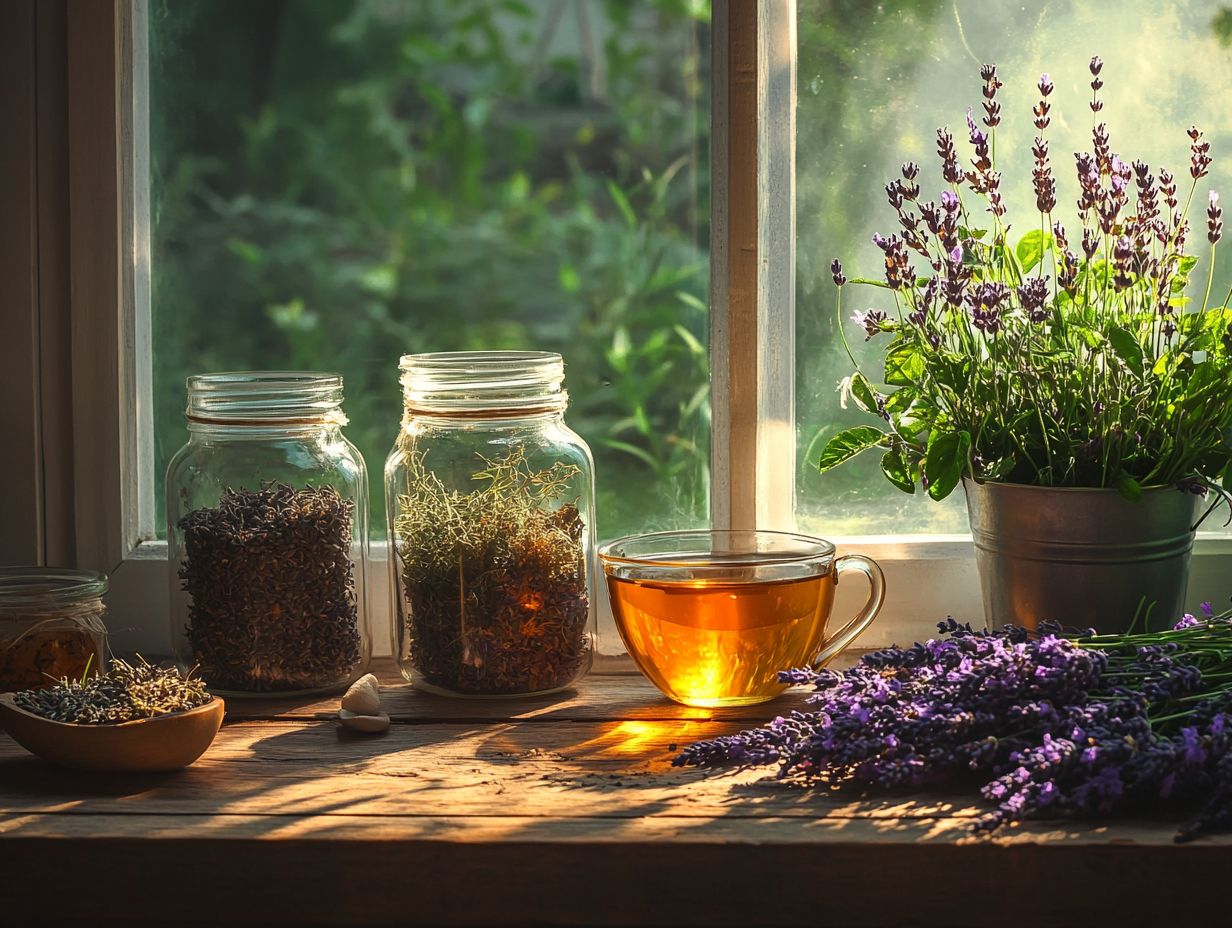
Physical and emotional signs of anxiety can manifest differently for everyone. They often present a range of recognizable symptoms.
For instance, you might experience a rapid heartbeat that brings an unsettling wave of panic. Meanwhile, another person may notice muscle tension that leads to discomfort or fatigue. The emotional signs frequently intertwine with these physical reactions; excessive worry can grip you, creating an overwhelming sense of dread about everyday situations. Irritability can also creep in, making it challenging to engage peacefully with others or concentrate on tasks.
Recognizing these symptoms is essential, as they provide vital insights into the underlying anxiety and its influence on your well-being.
Natural Remedies for General Anxiety Relief
Natural remedies for general anxiety relief present a whole-body approach for managing anxiety symptoms and enhancing your mental health, including natural remedies for social anxiety, without the unwanted side effects that often accompany conventional treatments.
These remedies include various techniques, from relaxation practices like deep breathing and meditation to herbal solutions such as chamomile tea and essential oils like lavender and kava kava.
By weaving these natural treatments into your daily routine, including omega-3 fatty acids and vitamin B12, you can cultivate effective coping strategies that foster overall well-being and provide genuine anxiety relief before bed.
Cognitive Behavioral Therapy
Cognitive Behavioral Therapy (CBT) is a highly effective solution for anxiety. It focuses on transforming negative thought patterns to enhance emotional responses.
This therapeutic approach gives you the power to identify and challenge the irrational beliefs that fuel your anxiety, ultimately leading to a healthier mindset. By incorporating techniques like exposure therapy a method where you gradually face your fears and changing how you think, CBT provides practical coping strategies tailored for your unique triggers.
As you progress through your therapeutic journey, you ll learn to replace fear-inducing thoughts with more balanced perspectives. This cultivates resilience in the face of anxiety. Research consistently shows that employing these methods can lead to significant reductions in anxiety symptoms, enhancing your overall well-being and paving the path to a more fulfilling life.
Meditation and Mindfulness Practices
Meditation and mindfulness practices are invaluable tools that can significantly reduce your anxiety and enhance your mental well-being.
Today s fast-paced world can be overwhelming. Relaxation techniques like focused breathing exercises and loving-kindness meditations help you find peace amidst daily stresses.
By engaging in these practices, you cultivate a deeper awareness of your thoughts and feelings, creating space for calm. These techniques not only help you feel calm and in control but also foster resilience and emotional balance over time.
You can also try integrating activities such as yoga or guided imagery. These can further bolster your mental health, allowing for a holistic approach to achieving serenity and improved emotional regulation.
Herbal Supplements and Essential Oils for Anxiety
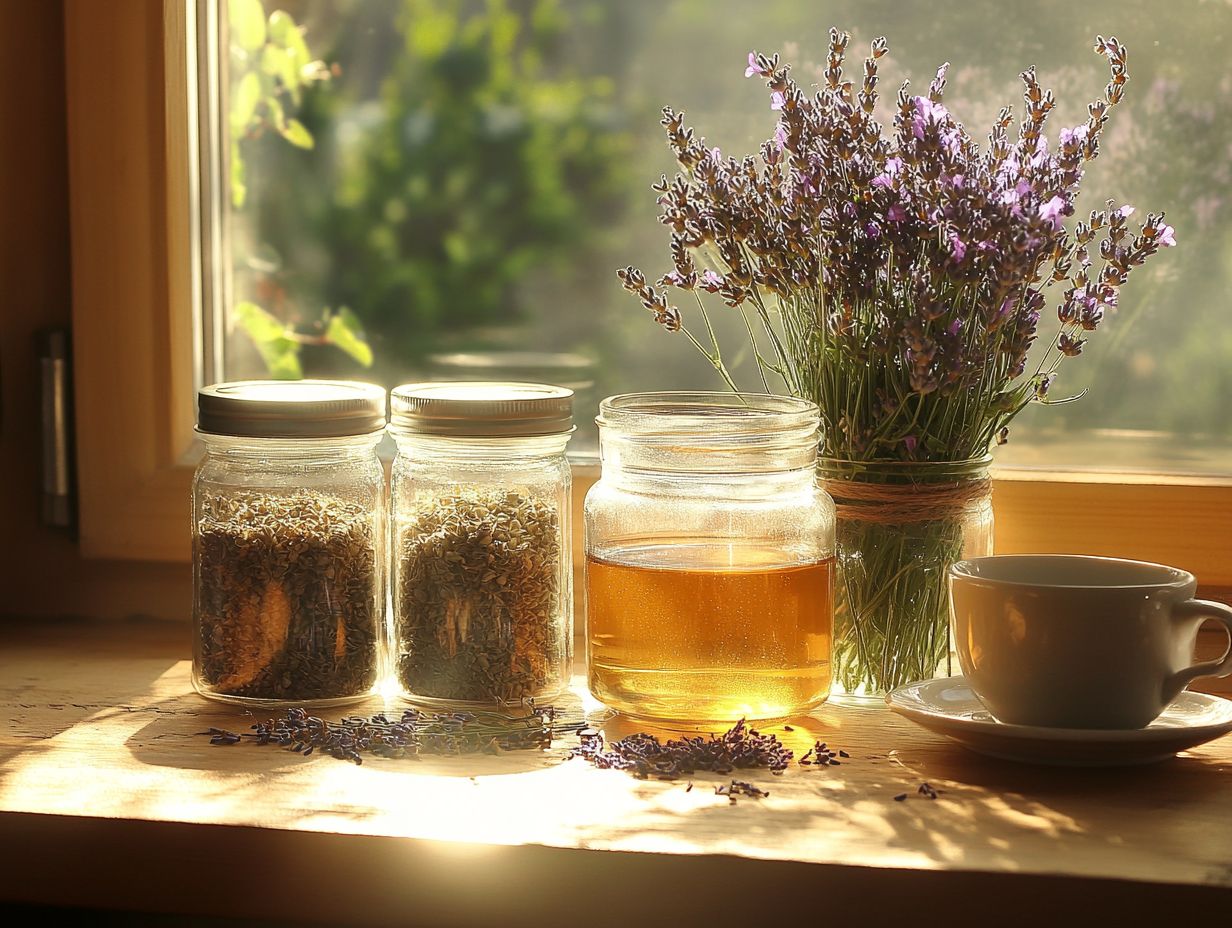
Herbal supplements and essential oils have emerged as sought-after natural remedies for anxiety relief. For those looking for effective solutions, navigating anxiety with natural remedies such as chamomile, lavender, and kava kava stands out as some of the most recognized options.
These plant-based solutions offer more than just delightful aromas or flavors; they draw on centuries of traditional use. They provide holistic methods for managing stress and tension, including essential oils like CBD oil.
Chamomile is celebrated for its calming effects and its ability to enhance sleep quality. This can help you feel refreshed and less anxious.
Lavender oil is renowned for its capacity to lower cortisol levels, promoting a sense of relaxation and balance.
Kava kava shines with its unique compounds that foster tranquility. This makes it a favored choice for those seeking natural anxiety relief.
Together, these herbal options present a compelling argument for weaving nature’s bounty into your daily wellness routine.
Exercise and Physical Activity
Engaging in regular exercise and physical activity can be an exceptionally effective strategy to reduce anxiety and enhance overall mental health.
Consider the unique benefits offered by various forms of exercise. Yoga, running, and strength training can all significantly alleviate symptoms of anxiety and promote better sleep hygiene.
For example, yoga combines physical movement, controlled breathing, and mindfulness. This helps cultivate a sense of calm and emotional balance.
Cardiovascular activities like running or cycling elevate your endorphin levels, which are natural chemicals in the brain that improve mood.
Let s not overlook strength training. It boosts your physical strength and instills a sense of accomplishment that reinforces your self-esteem and confidence.
By embracing these diverse exercise modalities, you’ll discover a holistic approach to managing anxiety more effectively while enjoying both physiological and psychological benefits.
Incorporating Natural Remedies into Daily Life
Incorporating natural remedies, including mindfulness-based techniques and relaxation techniques, into your daily life offers a refined approach to managing anxiety effectively.
Making subtle adjustments to your everyday activities can help. For instance, integrating breathing exercises, mindfulness practices, and natural sleep aids to alleviate anxiety will create a supportive environment for anxiety management.
Understanding how to use these natural treatments with professional guidance can amplify their effectiveness. This ultimately enhances your mental health and fosters a more balanced lifestyle.
Creating a Holistic Approach to Anxiety Management
Creating a holistic approach to managing anxiety means addressing your mind, body, and spirit with varied coping strategies and natural remedies.
This varied approach might include regular physical activity to unleash those feel-good endorphins that are crucial for lifting your mood.
Consider incorporating dietary supplements, such as omega-3 fatty acids or herbal treatments like ashwagandha. These nutrients can often be in short supply in your diet.
Building emotional support through community connections or therapy can cultivate a nurturing environment, promoting growth and healing.
Integrating practices like mindfulness meditation or yoga can enhance your mental health. This creates a seamless connection between physical and emotional wellness.
By embracing this inclusive approach, you may find a more balanced path to overcoming anxiety.
Frequently Asked Questions
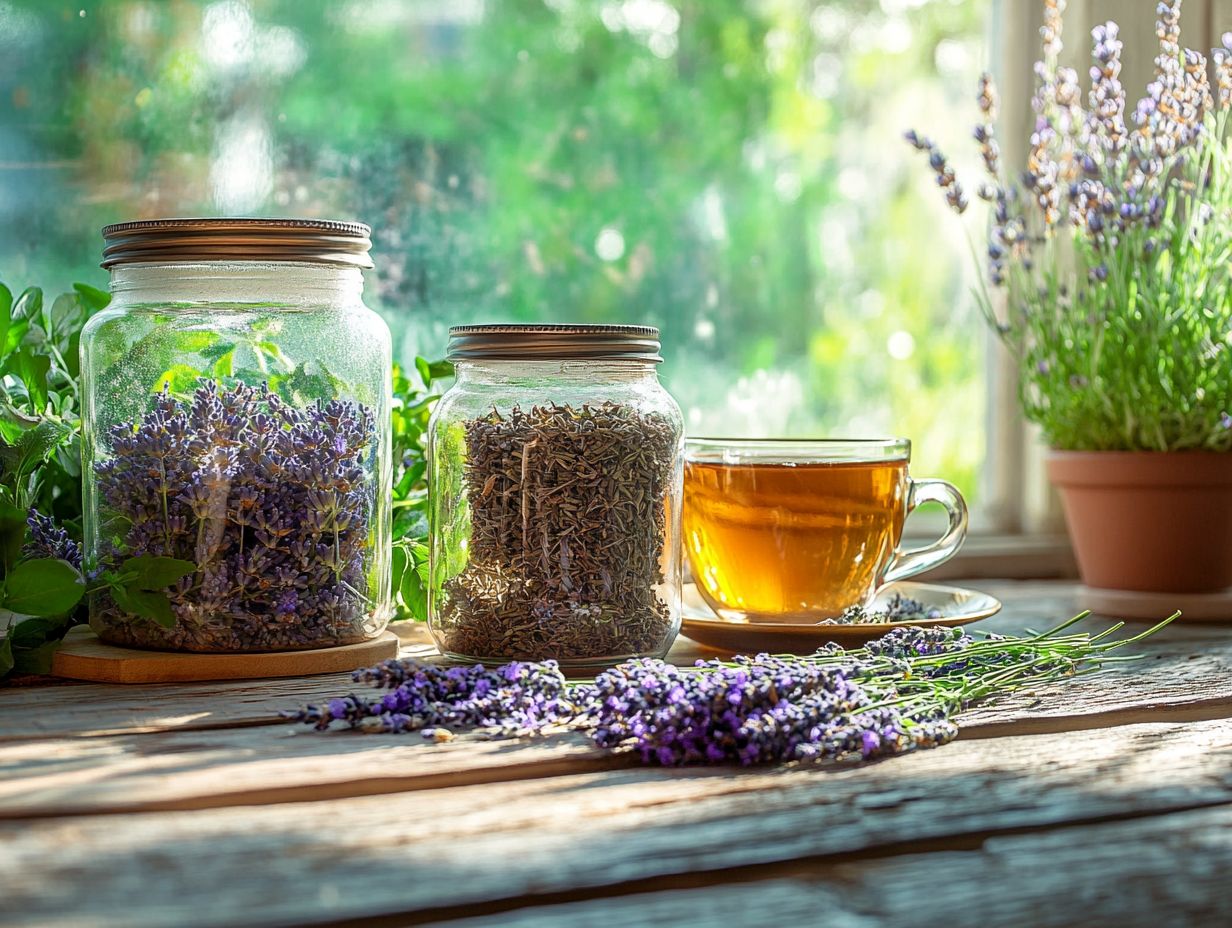
Start today to experience the benefits of these natural remedies!
What are natural remedies for general anxiety relief, including herbal remedies and aromatherapy?
Natural remedies are alternative treatments that help ease anxiety symptoms without prescription medications. These may include Nature’s remedies: herbs for anxiety, relaxation techniques, and lifestyle changes.
What are some common herbal remedies for general anxiety relief?
Common herbal remedies include chamomile, valerian root, and passionflower. For those seeking additional options, understanding Bach flower remedies for anxiety can also provide calming effects.
Always consult with a healthcare professional before adding herbal remedies to your routine.
Can exercise help with general anxiety relief?
Yes, regular exercise is an effective way to relieve anxiety. Physical activity releases endorphins, which boost your mood and lessen anxiety.
Aim for at least 30 minutes of exercise each day to enjoy the maximum benefits.
How can mindfulness and relaxation techniques aid in general anxiety relief?
Mindfulness practices like deep breathing, meditation, and yoga calm the mind and ease anxiety symptoms. They also promote relaxation and overall well-being.
Are there dietary changes that can help with general anxiety relief?
Yes, certain dietary changes can reduce anxiety. Cut back on caffeine and alcohol; focus on whole foods and healthy fats found in fish and nuts.
Staying hydrated and limiting processed or sugary foods is also crucial for managing anxiety.
How long do natural remedies for general anxiety relief take to work?
The time it takes for natural remedies to work varies by person. Some may feel relief right away, while others might take longer.
Stay consistent with your chosen remedy and give it time to work. If symptoms persist, consult a healthcare professional.

